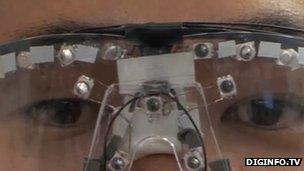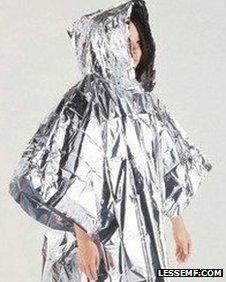How to get away from everyday technology
- Published

Not everybody is so relaxed about using their phone
Actress Kiera Knightley once described the internet as "dehumanising" and said she avoided it, while singer Sir Paul McCartney has previously admitted to being baffled by High Street bank cash machines.
Ms Knightley may have had a change of heart - she recently told US chat show host Ellen de Generes that she had looked online for advice about planning her wedding - but for many so-called "digital deniers", the opportunity to block out technology is often welcomed.
"Technology is becoming more personal," security expert Graham Cluley told the BBC.
"We're going to see more and more devices that are carried on your person or worn - I am expecting there to be something of a backlash. Some people will love those things, others will find it very upsetting."
For those who consider themselves to be in the latter group, technology - ironically - may provide the solution.
'ANTI-GLASS' GLASSES

Prototype anti-facial-recognition glasses developed by the National Institute of Informatics in Japan
The National Institute of Informatics in Japan has developed prototype glasses that inhibit facial-recognition cameras.
Described by some as the antidote to Google Glass, these specs contain 11 LED lights along the eyebrows and nose.
"The LEDs are installed around these locations because a feature of face detection is the eyes and part of the nose appear dark, while the other part of the nose appears bright," Prof Isao Echizen told news website diginfo.tv, external.
"So by placing light sources near the dark parts of the face, we've succeeded in cancelling face detection characteristics, making face detection fail."
Prof Echizen is also developing visors that contain reflective material or absorb light to inhibit cameras that do not rely on infra-red.
RADIATION-BLOCKING CLOTHES

This disposable poncho claims to offer protection from an "irritating sea of wireless radiation"
Emil DeToffol, an engineering graduate and former dentist in New York, founded the retail website lessEMF.com, external in 1996 after growing concerned about unproven health fears surrounding the electromagnetic radiation commonly emitted by everyday electronics.
The NHS says on its website, external that, so far, "a number of studies, both in the UK and internationally, have not identified any health risks associated with [telecommunications] devices" but adds that "it may be too early to detect possible long-term risks or problems that may be associated with them".
But Mr DeToffol's company specialises in selling a variety of products - ranging from baseball caps to bedding - containing silver, copper, stainless steel or carbon fibres that reflect radiation.
"In the 1990s the issues were power lines, electric blankets, CRT [cathode-ray tube] display screens - there was no wi-fi. Cellphones were just getting started," Mr DeToffol told the BBC.
"Now, as our world becomes more electrified... people are getting sicker."
While he does not suffer himself, Mr DeToffol said he had heard from customers around the world, complaining of a variety of symptoms ranging from headaches and irritability to tinnitus and cardiac issues.
He did concede that radiation might not always be the cause.
"At this point it is not the majority of the population, but it is a certain percentage that's made quite ill by this," he said.
The company's best-sellers were its baseball cap and balaclava, followed by "hoodie" tops that covered both head and torso, added Mr DeToffol.
"The issue comes down to what part of the body does the person need to shield?" he said.
"Most popular tends to be shielding for the head - particularly for when people are sleeping."
DIY FARADAY CAGES

An example of a Faraday Cage keeping out electricity
Named after 19th Century British scientist Michael Faraday, a Faraday cage is a metal construction that traps electromagnetic waves.
This means devices such as mobile phones or anything containing a radio-frequency identification (RFID) chip - including passports, travel cards and credit cards - are unable to receive or transmit data from inside one.
Wired magazine published an online guide for making a hand-sized Faraday Cage, external out of duct tape and aluminium foil for those concerned about the possibility of the covert retrieval of information from cards and gadgets via discreet scanners.
One unnamed man who defected from North Korea attempted his own interpretation of a Faraday cage during his time in the tightly controlled regime - where mobile phone use is strictly monitored by the authorities.
"In order to make sure the mobile phone frequencies are not being tracked, I would fill up a washbasin with water and put the lid of a rice cooker over my head while I made a phone call," he is quoted as saying in a research paper called A Quiet Opening, external.
"I don't know if it worked or not, but I was never caught."
PAINT JOB

The paint was said to be the first of its kind that could absorb frequencies of 100 gigahertz
In 2009 researchers at the University of Tokyo developed a kind of paint that can block wireless signals.
The paint contains an aluminium oxide that resonates at the same frequency as wi-fi, blocking the path of data both in and out of an indoor environment where the paint is present.
The idea of radio frequency blocking paint was not new even then - but this was the first of its kind to absorb frequencies of 100 gigahertz, the researchers said.
'pick battles'
"The very existence of 'anti-technology' means that people are worried and we should take that seriously," said technologist Suw Charman-Anderson.
"We need to have to a public discussion about what we find acceptable and what we don't.
"Anybody who thinks they are not being tracked may be a little naïve - if you buy your groceries with a credit card or use a loyalty card then you are being tracked," she added.
"But the level of vigilance that would be needed to completely hide yourself would probably have negative consequences on your emotional wellbeing - I think we have to pick our battles."
- Published20 April 2012
- Published13 September 2011